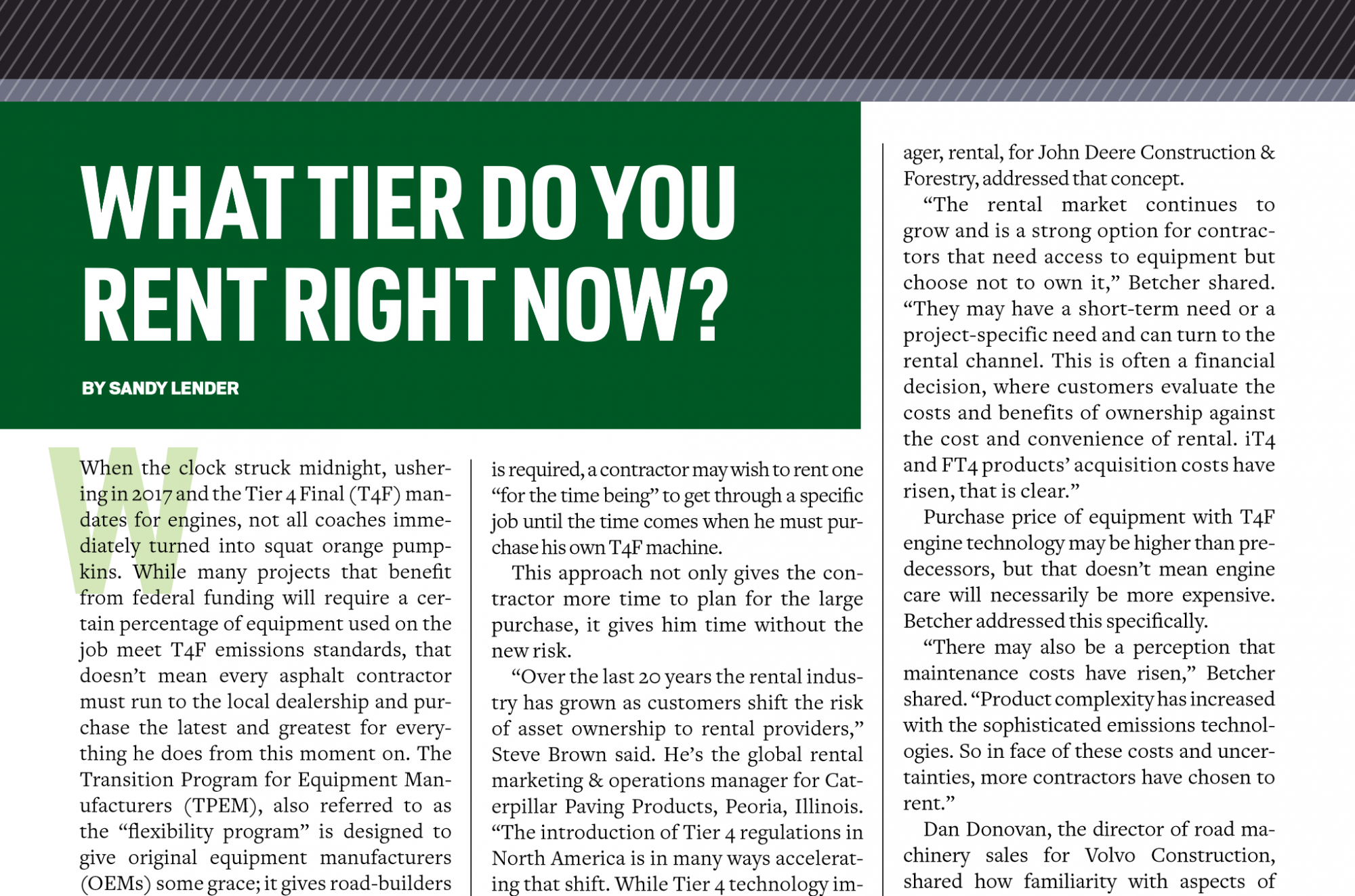What Tier Do You Rent Right Now?
BY Sandy Lender

When the clock struck midnight, ushering in 2017 and the Tier 4 Final (T4F) mandates for engines, not all coaches immediately turned into squat orange pumpkins. While many projects that benefit from federal funding will require a certain percentage of equipment used on the job meet T4F emissions standards, that doesn’t mean every asphalt contractor must run to the local dealership and purchase the latest and greatest for everything he does from this moment on.
The Transition Program for Equipment Manufacturers (TPEM), also referred to as the “flexibility program” is designed to give original equipment manufacturers (OEMs) some grace; it gives road-builders grace as well. One way to ease into the new realm of high-tech engine equipment is by letting the rental house keep the risk for a while. But just a while. Here’s what the experts have to say. “Every machine that CASE sells in the United States is a Tier 4 Final machine,” David Garton said.
He’s the manager of rental accounts for CASE Construction Equipment, Racine, Wisconsin. “It’s only a matter of time before those interim Tier 4s [iT4] and Tier 3s run out of their useful life and have to be replaced. That being said, there are some jobs, mostly government type jobs, whether it’s local or federal, where the contract requires the contractor to use the latest technology available. So even if the contractor does not have a Tier 4 machine, he has to use a Tier 4 Final machine on that job.”
That’s where a rented machine often comes in.
“We have to sell Tier 4 Final machines to the rental companies, period,” Garton continued. “That’s not to say they don’t have Tier 3 machines in their fleets.” Garton explained that in those situations where a T4F machine is required, a contractor may wish to rent one “for the time being” to get through a specific job until the time comes when he must purchase his own T4F machine.
This approach not only gives the contractor more time to plan for the large purchase, it gives him time without the new risk.
“Over the last 20 years the rental industry has grown as customers shift the risk of asset ownership to rental providers,” Steve Brown said. He’s the global rental marketing & operations manager for Caterpillar Paving Products, Peoria, Illinois. “The introduction of Tier 4 regulations in North America is in many ways accelerating that shift. While Tier 4 technology improves fuel efficiency, it also increases total ownership costs. Higher acquisition cost and lifecycle maintenance costs are a reality with the environmental benefits that Tier 4 brings.”
As IEDA’s Kristen Williams shared in her article on page xx, the T4F engines can sometimes push a purchase price up as much as 20 percent higher than prior to the new regs. Derek Betcher, the product marketing manager, rental, for John Deere Construction & Forestry, addressed that concept.
“The rental market continues to grow and is a strong option for contractors that need access to equipment but choose not to own it,” Betcher shared. “They may have a short-term need or a project-specific need and can turn to the rental channel. This is often a financial decision, where customers evaluate the costs and benefits of ownership against the cost and convenience of rental. iT4 and FT4 products’ acquisition costs have risen, that is clear.”
Purchase price of equipment with T4F engine technology may be higher than predecessors, but that doesn’t mean engine care will necessarily be more expensive. Betcher addressed this specifically.
“There may also be a perception that maintenance costs have risen,” Betcher shared. “Product complexity has increased with the sophisticated emissions technologies. So in face of these costs and uncertainties, more contractors have chosen to rent.”
Dan Donovan, the director of road machinery sales for Volvo Construction, shared how familiarity with aspects of T4F will help contractors ease into routine maintenance.
“For rental houses, our primary products are the small platform asphalt and soil compactors. The Tier 4 Final-compliant Volvo engines have lower horsepower and have passive regeneration without DEF. The major change that came with Tier 4 Final engines from Volvo is the interface between the operator and engine regeneration, which is now up to 500 hours for our larger platform compactors and pavers.
This is a much longer window than Tier 4i, which could require a regen every 8 hours, particularly due to idling. Because the technology is uncomplicated, it has made the transition very easy for rental customers and helped contain rental rates. Many contractors already have Tier 4 Final technology on their vocational trucks, so they are familiar with DEF and how to manage the fluid.”
Relying on the rental house to ease into T4F-compliant equipment offers benefits and drawbacks, just as relying on the rental house for fleet management always has. Industry experts shared their thoughts here.
David Garton
 Manager of Rental Accounts, CASE Construction Equipment
Manager of Rental Accounts, CASE Construction Equipment
“There’s a great opportunity for rental houses to capitalize on this Tier 4 technology and the fears and the hesitations that come along with it, but then in the long term they will shoulder the burden of whatever maintenance has to go along with it. And then that frees the contractor up to do what he does best.”
Steve Brown
 Global Rental Marketing & Operations Manager, Caterpillar Paving Products
Global Rental Marketing & Operations Manager, Caterpillar Paving Products
“Higher total cost of ownership creates challenges for rental companies as well. With the introduction of Tier4, rental fleets are now mixed with lesser regulated machines. This creates rental rate pressure over the balance of the fleet offering. The impact is also felt in the resale channel as export opportunities are limited by lesser regulated markets. As the overall population of construction machinery migrates to Tier4 compliance these issues will ease. Until then the rental industry must seize the opportunity to be a value added partner to contractors. Consultation, training and managing ownership risk help contractors navigate the complexities of environmental regulation.”
Derek Betcher
 Product Marketing Manager, Rental, John Deere Construction & Forestry
Product Marketing Manager, Rental, John Deere Construction & Forestry
“Equipment rental is so widespread, it is part of the fleet strategy for contractors large and small, emerging and established. The ARA estimates that 50-60% of the equipment on North American jobsites is now rented, not owned, and they call this important metric rental penetration. From John Deere’s perspective, when we build reliable, productive, rentable equipment, regardless of the emissions generation it’s from, we will earn the chance to be part of this long-term growth trend in rental penetration.”
Jessica Shetler
 Product Marketing Manager, Engines and Powertrain, John Deere Construction & Forestry
Product Marketing Manager, Engines and Powertrain, John Deere Construction & Forestry
“The IT4 and FT4 engines have proven to be reliable. The emissions solutions were developed with a focused building block approach leveraging technology that began with the PowerTech Engine in the late 1990s and continuing to mature into the Final Tier 4 solution we have today. This has allowed John Deere to have a robust emissions solution that offers the best engine performance expected by our customers to accomplish the job they have at hand. This strategy has provided experience, with over 411 million customer hours on the exhaust filter that began with Interim Tier 4 and over 23 million hours of experience with the Final Tier 4 technology. With regeneration being transparent to our customers and no interaction required; they can focus on the job at hand.”
Dan Donovan
 Director, Road Machinery Sales, Volvo Construction Equipment
Director, Road Machinery Sales, Volvo Construction Equipment
“National contractors typically rent asphalt compactors for multiple seasons and have numerous operators. They are looking for a simpler solution and have that with the Tier 4 Final machines, so they are updating their fleets. Soil compaction is a rent-to-own business, so customers can get familiar with the new technology before committing. Here, too, early reports are that Tier 4 Final machines are more user-friendly.”
TPEM
According to the U.S. Environmental Protection Agency (EPA) website, the “Transition Program for Equipment Manufacturers, better known as “TPEM” or “flexibility program,” is a temporary exemption that allows diesel equipment manufacturers to delay installing Tier 4-compliant engines in their products for up to seven years.”
Depending on the engine’s capacity, the manufacturer’s volume of production within the power category, and other variables, the OEM has calendar year extensions—ending in 2021—during which it can delay production of machines with T4F-compliant engines. That means contractors could, theoretically, still have access to new equipment with “less than” T4F engine technology through calendar year 2021.
